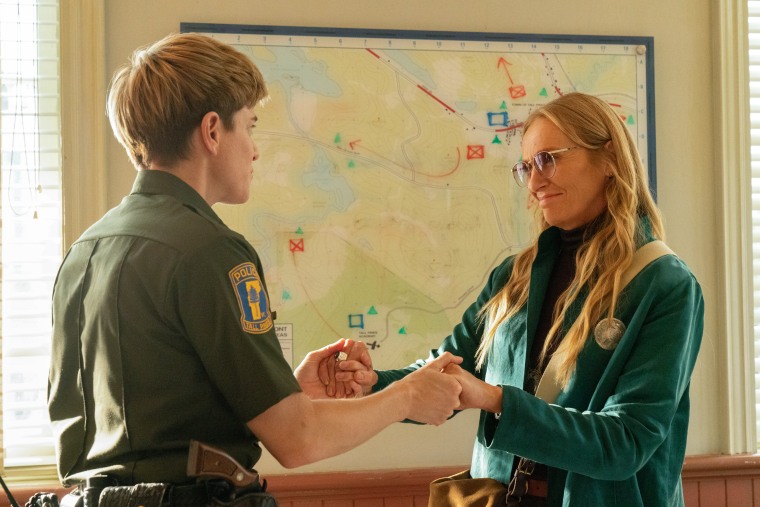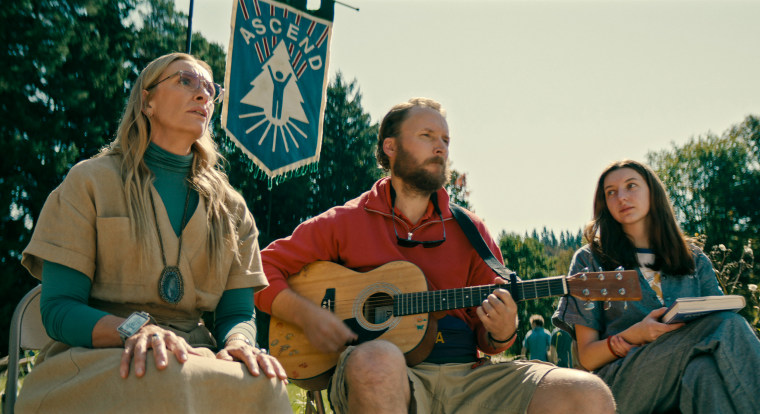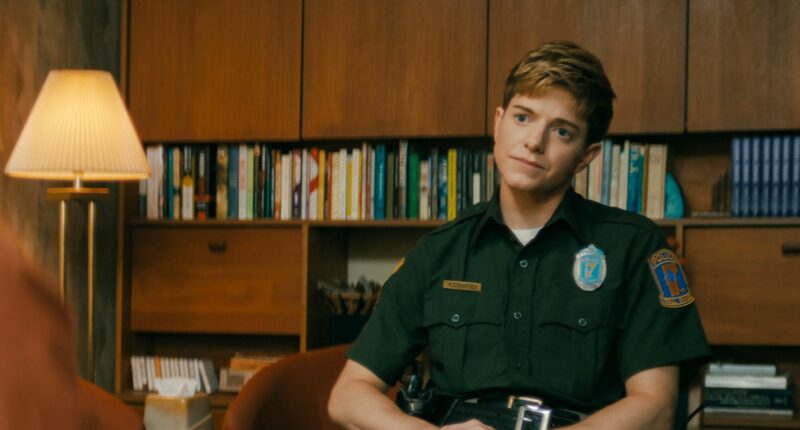Share this @internewscast.com
Canadian comedian Mae Martin’s new limited series on Netflix, which mixes comedic elements with thriller and horror genres, may seem like a major shift for those familiar with their stand-up comedy and the semi-autobiographical series “Feel Good.”
“It’s interesting because, to me, this doesn’t feel like a big leap,” Martin, who identifies as nonbinary and uses they/them pronouns, shared with NBC News. “The themes are quite similar to my other work. It’s introspective and explores topics like adolescence and identity.”
Titled “Wayward,” debuting on Thursday, the series features Martin as Alex Dempsey, a cop who relocates with his pregnant wife, Laura (Sarah Gadon), to the seemingly idyllic town of Tall Pines. Soon after, Alex meets two students from a nearby academy for troubled teens who are attempting to escape. As he delves into some peculiar occurrences, Alex begins to suspect that Evelyn Wade (Toni Collette), the mysterious leader of the academy with connections to Laura, might be behind the town’s issues.
“Alex serves as the audience’s perspective, trying to unravel everything. It’s easy to be lured in by a town that seems so welcoming and progressive, offering him everything he’s ever dreamed of,” Martin elaborates. Throughout the eight episodes, Alex, a transgender man, “is challenged by his moral beliefs and his deep desire for a conventional family and societal acceptance he’s always craved.”
Following international fame for co-creating “Feel Good” during the COVID-19 pandemic, where Martin portrayed a version of themselves, viewers might have anticipated another similar project. However, Martin expressed a long-standing interest in setting a series within the “troubled teen industry,” which encompasses various controversial residential youth programs for struggling adolescents.
“My best friend Nicole was sent to a troubled teen program in the U.S. and was there for nearly two years,” Martin, who grew up in Toronto, explained. “This sparked my curiosity about the dubious practices and bizarre history of the industry, which traces back to self-help cults in the 1970s and involves dramatic behavioral modification methods.”
At first, Martin thought the series would be more of a classic, coming-of-age story in the vein of “Stand By Me” or “Holes.” But after hearing about their best friend’s harrowing experiences at one of those unregulated schools — where she recalled being starved, sleep deprived and forced to dig and stand in her own grave overnight — Martin could tell that a tale about troubled teens being held against their will would be much more in line with classic horror and thriller films such as “Fargo,” “Get Out” and “Rosemary’s Baby.”
Over time, Martin said, they became more interested in looking “directly at how many young people are pathologized at such a young age, just for having a pretty normal reaction to a sick society.”
“When you take kids who are in crisis and your reaction is punitive, you take away their opportunity to go through all the normal milestones of development, and you ascribe labels to them that really affect how they see their own potential,” they said.

Martin said they have found themselves increasingly thinking about “the state of the world that we’re passing down to young people, and about intergenerational conflict.”
“As we get older, we suppress so much of our sensitivity and our critical thinking and even our empathy just in order to survive in the world,” Martin said. “So we can’t help but kind of gaslight young people out of their very correct observation that the world is insane, and that there’s a lot of hypocrisy out there.”
From the outset, Martin said, they knew they wanted to play Alex. While his gender identity is only explored in passing, “a lot of his inner yearning is connected to that and how he sees himself and wants to be seen in the world,” especially as a husband and an expectant father, Martin explained.
“The show’s set in 2003, and I think there wasn’t a lot of fluency around nonbinary identity then and not a lot of they/thems,” Martin noted, adding that playing a man “just made sense” to them. “Who knows where I’ll end up on that spectrum? But it felt pretty natural to me as an actor — more natural than it would’ve been to play a woman.”
As the creator and co-showrunner of “Wayward,” Martin is one of the few LGBTQ writers in Hollywood who are shepherding their own mainstream projects. While they said they try not to think too much about their public profile when creating their projects, Martin said it is “scary” to be a queer creative at a time when President Donald Trump and conservatives have been actively targeting and rolling back legal protections for the queer community, especially trans and nonbinary people.

“What makes things difficult is when things are charged politically, like they are now, it makes it seem like even having a trans character or a gay character is a political statement and immediately puts your project in a niche category,” said Martin. “It’s crazy that your career can be affected by political swings like that.”
Martin said they see their visibility as a prominent nonbinary comedian in the current climate as a double-edged sword. On the one hand, they want to tell stories that will reach the widest audience possible and, hopefully, in turn, create more empathy for the LGBTQ community. But at the same time, Martin said, they know that their mere existence can be seen as a kind of political statement.
They said they would welcome an environment where an LGBTQ character’s identity was “just incidental,” rather than a defining feature of the project, “and the focus is actually on these hugely universal themes and storylines.”
In “Wayward,” for instance, “there are nuances that are specific to the queer experience that I think queer people will pick up on and relate to, but those things are pretty relatable to anyone who’s experienced any kind of otherness,” Martin said.
Martin speculated that the heightened backlash against the trans community is connected to depictions of trans people that have disproportionately focused on transphobia, bigotry and trauma.
“It is a part of the trans experience, but it’s just one small part of a human experience,” they said. “The more we can have diverse characters who are flawed, funny, weird and relatable, who make mistakes, who have relationships — I think that would be more helpful.”
Martin acknowledged there’s been a contraction in the output of diverse stories, but they plan to keep “sneaking subversive things” into more mainstream projects.
“I’ll just keep my head down, keep inundating people with scripts, and hope to ride it out and do my part,” Martin said.










